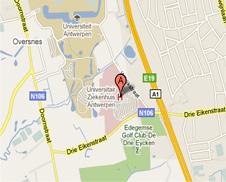B-Will Study: National Survey of von Willebrand Disease in Belgium
Von Willebrand's disease (VWD) is an autosomally inherited bleeding disorder caused by a deficiency or abnormality of von Willebrand factor (VWF). VWF is a multimeric adhesive protein which plays an important role in primary hemostasis by promoting platelet adhesion to the subendothelium at sites of vascular injury and platelet-platelet interactions in high shear-rate conditions.
It is also the carrier of factor VIII (FVIII), thus indirectly contributing to the coagulation process.
VWD has a prevalence of about 1% in the general population, but the figure for clinically relevant cases is lower (about 100/million inhabitants). Bleeding manifestations are heterogeneous: mucosal bleeding is typical of all VWD cases but hemarthrosis and hematomas may also be present when FVIII levels are low. Most cases appear to have a partial quantitative deficiency of VWF (type 1 VWD) with variable bleeding tendency, whereas qualitative variants (type 2 VWD), due to a dysfunctional VWF, are clinically more homogeneous.
Type 3 VWD is rare and the patients have a moderate to severe bleeding diathesis because of the virtual absence of VWF, and a recessive pattern of inheritance.
There are no available data about the number of VWF patients in Belgium. Diagnosis of VWD is often not made in milder forms of the disease and often incomplete in other forms.
The B-Will study is a national survey into the patients diagnosed with Von Willebrand’s disease in Belgium through university hospitals and larger regional hospitals: frequency, type, distribution, bleeding phenotype, underlying mutation, ...
Patients will be asked to agree to an interview in which their bleeding phenotype will be established through the filling in of the ISTH Bleeding Score, and blood sampling will be done for analysis.
Full laboratory characterisation and (sub)typing of VWD patients will be done at the Antwerp University Hospital with all available techniques, including identification of causative molecular abnormalities in the VWF gene.
Furthermore, frozen plasma and DNA samples will be kept for further future research into VWD (VWD-Biobank).
Patients suspected of having VWD can be included:
Type 3:VWF:Ag and VWF:RCo <5%
Type 2:Decreased Ristocetin Induced Platelet Aggregometry RIPA (concentration 1.2-1.5 mg/dl) and/or VWF:RCo/VWF:Ag < 0.7 (type 2A/2M)
or unexplained thrombocytopenia where there is a suspicion of VWD and/or positive low concentration RIPA (0.8mg/ml) (type 2B)
or all patients with VWF:CB/VWF:AG ratio < 0.7 (type 2A, Collagen type)
or FVIII:c/VWF:Ag
Type 1:VWF:Ag< 35%
Conclusions or recommendations
This study has been initiated by the Hemostasis Unit of the Antwerp University Hospital (UZA) (prof dr Alain Gadisseur) and has the support of the Belgian Society on Thrombosis & Hemostasis (BSTH).
The protocol received Ethical Committee approval in several university and affiliated hospitals at the end of 2011. Interested centres can contact the principal investigator for more information.
Contact details
Prof dr Alain Gadisseur
Department of Hematology
CSL Behring Chair in Von Willebrand Disease (Antwerp University)
Antwerp University Hospital (UZA)
Drie Eikenstraat 655
2650 Edegem
T: 03 821 3779
F: 03 821 4286
alain [dot] gadisseur [at] uza [dot] be

